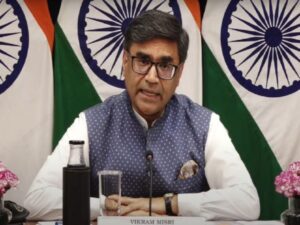Pakistan’s economy to grow by two per cent in the next fiscal year, says World Bank
Islamabad, Jun 7 (PTI) The World Bank has projected Pakistan’s economy to grow by two per cent in the next fiscal year, much lower than the 3.5 per cent target set by the country’s top economic body, saying the lasting effects of the August 2022 floods, along with policy uncertainty and limited foreign exchange resources have depressed activity in the country.
The conflicting estimates by the World Bank and the National Economic Council came on Tuesday, reported the Dawn newspaper.
“In Pakistan, the lasting effects of the August 2022 floods, along with policy uncertainty and limited foreign exchange resources to pay for imports of food, energy, and intermediate inputs, have depressed activity, with industrial production contracting by about 25 per cent in the year to March 2023,” the bank said in its latest Global Economic Prospects report.
It said that the continuing effect of last year’s floods in Pakistan, compounded by worsening social tensions, high inflation, and policy uncertainty, is estimated to have limited growth to 0.4 per cent this fiscal year, a 1.6 percentage-point downward revision from January. The government has, meanwhile, put the current year’s GDP growth rate at 0.3 per cent.
“Agriculture output seems likely to have contracted for the first time in two decades. Economic recovery in the next two fiscal years is expected to be anaemic, with the growth of 2 per cent and 3 per cent, respectively, as there is limited fiscal room for the government to support recovery from flood-related damages,” the bank said in the report.
It said that consumer price inflation remains above target in most economies and is particularly high in Pakistan and Sri Lanka. Limited foreign exchange reserve cover in some economies limits access to imported intermediate goods for production, it said.
“With dwindling foreign exchange reserves and stagnant remittances, the government has increased exchange rate flexibility, allowing the Pakistani rupee to depreciate by 20 per cent since the start of the year,” it added. “Consequently, headline consumer price inflation has risen sharply, reaching 38 per cent in the year to May, its highest level since records began in the late 1970s.”
While poverty has recently been increasing in countries facing severe economic pressures notably Afghanistan, Pakistan and Sri Lanka it is expected that the region will resume its downward trend that was interrupted in 2020-21.
The number of people in South Asia living on less than USD 3.65 a day in 2023 is expected to be well below the pandemic-induced uptick in 2020.
The bank said import restrictions imposed by several economies (Bangladesh, Nepal, Pakistan, Sri Lanka), which adversely affected economic activity, have been relaxed as external imbalances have improved and exchange rate pressures have eased.
Food export bans, however, are expected to remain in place in Bangladesh, India and Pakistan through this year despite falling global prices.
Some economies in South Asia have suffered significant domestic shocks, and deep crises are continuing to undermine growth, particularly in Afghanistan, Pakistan and Sri Lanka.
It observed that more than half of South Asia had been affected by one or more climate-related disasters over the past two decades, with the 2022 floods in Pakistan leaving one-third of the country under water and causing damage estimated at 4.8per cent of GDP.
Overall, the report forecasts the growth in the region to slow marginally in 2023, to 5.9 per cent, and more significantly in 2024, to 5.1 per cent.
Separately, the National Economic Council meeting chaired by Prime Minister Shehbaz Sharif approved an estimated 3.5 per cent GDP growth target for its 2023-24 financial year budget, according to Planning Minister Ahsan Iqbal.
The target is way ahead of the 0.29 per cent growth expected during the current year ending on June 30 and shows that the government is expecting improvement in the economic conditions in the coming months.
Meanwhile, Pakistan announced that it will close markets by 8 pm beginning July 1 as its government scrambled to save energy costs to provide a breather to the suffocating economy.
A similar decision was also announced in January this year but could not be implemented due to opposition from trade and business leaders.
Planning and Development Minister Iqbal said that the National Economic Council (NEC) in its meeting on Tuesday agreed to close markets and commercial centres by 8 pm from July 1 to conserve energy.
A statement by the PM Office stated that the provincial representatives were briefed on the National Energy Conservation Plan and that it would help reduce the country’s fuel import bill by over 10-15per cent or Rs 1 billion in a short period.
However, All Pakistan Anjuman-e-Tajran (APAT), the body representing the trader community of the country, opposed the government’s move.
“The government should withdraw the decision to close shops by 8 pm,” APAT President Ajmal Baloch said in a statement.
Rejecting the plan to close shops at 8 pm, he asked the energy minister to hold talks with traders.
Pakistan is facing an uphill task to pay for the import of petroleum products due to shrinking foreign exchange reserves which are just over USD 4 billion. With the economy growing at the rate of 0.29 per cent in the current fiscal year, the government is planning drastic measures to keep the country afloat.






